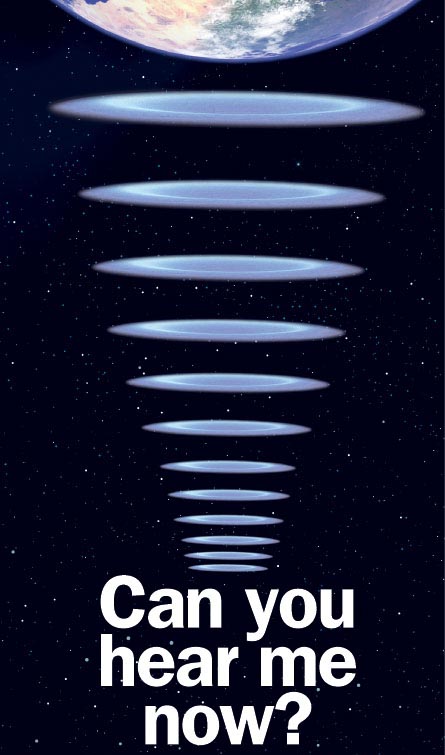The Earth is going silent. Digital television signals delivered by cable and satellite are quickly replacing analog broadcasts and reducing the number and power of radio waves leaking into space. For viewers at home, it means more channels and pictures of unsurpassed clarity. But for scientists seeking signs of advanced civilizations beyond the solar system, this sudden radio silence makes the search fuzzier.




Since traditional searches for extraterrestrial intelligence, collectively dubbed SETI, have assumed that the path to intelligence proceeds similarly throughout the galaxy, SETI researchers are now wondering: If extraterrestrials can’t hear us, how will we hear them? Some serious rethinking may need to be done. Much of the hunt for signals from ET so far has been based on a fading fad — a century-long blip of radio mania — rather than an enduring characteristic of galactic societies.
It’s not just television. Military radar, once the prime outgoing evidence for intelligence on Earth, now jumps from channel to channel, to confuse enemies trying to jam the signal. And the power radiated by cell phones is spread across more than a thousand channels, making the waves — to a planetary outsider — indistinguishable from noise.
“Our improving technology is causing the Earth to become less visible,” says astronomer Frank Drake, SETI’s paterfamilias. “If we are the model for the universe, that is bad news.”
For SETI researchers, that bad news comes after 50 years of no news. Since Drake first turned a radio telescope to the nearby stars Tau Ceti and Epsilon Eridani in 1960, there have been no signs of ET phoning Earth or phoning home — or phoning any other intelligence in the galaxy, for that matter.
“We have all seen our little bumps in the night, but we have never had repeated signals,” says Paul Horowitz of Harvard University.
In the past, failed SETI searches have fueled further efforts. And now, even in the face of the latest discouraging realization about the potential obsolescence of radio waves, optimism persists. Instead of packing up their radio telescopes, SETI researchers are reassessing what they look for and how they search. While signals from space are scarce, ideas for alternative strategies have been proliferating like new HD programming on TV.
SETI efforts are expanding the search to a wider range of electromagnetic channels, both at radio and optical frequencies. Some researchers propose new detection possibilities based on forecasts of what technologies extraterrestrials hundreds or even a million years ahead of Earthlings might possess. Other alien hunters argue for casting an even wider net, challenging scientists to open their minds to any unexplained signals as possible subtle footprints of life from beyond.
After all, now would be an unfortunate time for SETI to die. Evidence for potential life outside the solar system is piling up in the form of planets orbiting other stars. At the time of Drake’s first search, no one knew whether such planets existed. Astronomers have since found more than 400 exoplanets, and NASA’s Kepler mission is scanning the skies to find any that resemble Earth.
“All of astronomy has come to embrace this idea that there must be life out there,” says Gerald Harp of the SETI Institute, a nonprofit organization in Mountain View, Calif., that has been the powerhouse behind much of SETI.
The challenge: “Out there” is a pretty big place.
The ET lottery
There are roughly 300 billion stars in the Milky Way. Any life around any one of those stars could be broadcasting radio waves at frequencies ranging from 30 kilohertz to 300 gigahertz.
Covering that kind of ground — or in this case space — requires a lot of listening.
In 1960, Drake’s Project Ozma (named for the queen in L. Frank Baum’s Land of Oz) used a telescope in Green Bank, W. Va., to monitor two stars at 1.42 gigahertz, the radio frequency emitted by the neutral hydrogen atom. Drake tuned to this channel because, he thought, ET would be aware of water’s significance for life. Turns out it’s practical, too: The frequency falls within a quiet range that has little interference from human or natural sources. Since 1960, searches that target individual stars and those that sweep the entire sky have been conducted in a systematic way at frequencies between 1 and 3 gigahertz, but not much lower or higher.
That’s like trying to find a movie on HBO by randomly flipping to just one out of more than a hundred channels — assuming that your cable package includes HBO, the volume is loud enough and you’ve picked the right time for the movie you want to see.
“It’s a real long-shot bet,” Drake says.
One sure way to improve your chances is to try more channels. A new project using that strategy, the Allen Telescope Array, is under construction northeast of San Francisco. Of its 350 proposed telescopes, 42 are operational. The array will simultaneously monitor more than a billion channels from 0.5 to 11 gigahertz.
At an American Astronomical Society meeting in January, Harp described the array’s ability to search at a frequency of 4.462336275 gigahertz, in what’s called the PiHI range, because it’s the hydrogen atom’s emission frequency times pi, another value ET might know. Other similar systems — the Low Frequency Array headquartered in the Netherlands, the Atacama Large Millimeter/submillimeter Array under construction in Chile and the Square Kilometer Array (location to be determined) — will follow the Allen array’s lead. All of these systems, basically big telescopes built from small ones, will also cover more sky than their single-dish counterparts.
Beyond the radio realm
Radio telescopes, though, aren’t the only eyes on the skies. Some searches have been looking out into the darkness for pulses of light, which have frequencies higher than those of radio waves.
When Giuseppe Cocconi and Philip Morrison suggested the possibility of interstellar communication via electromagnetic waves in a 1959 paper in Nature, no human-produced light could have been detected at interstellar distances.
“In the ’50s, if you wanted a bright search light, you’d go to GE,” Horowitz says; the brightest light came from bulbs. “We couldn’t have predicted the laser.”
Today, powerful lasers can create light pulses that would outshine their nearest stars for a billionth of a second. Astronomers observing a momentary burst of extra light from a distant star could infer that it came from ET, since most light from natural sources lasts much longer.
Though such searches are ongoing, Horowitz says optical SETI programs should really look at infrared frequencies, just lower than those of visible light.
“Stars are darker in the infrared and lasers are brighter and the smog goes away,” Horowitz says. Infrared allows astronomers to see into the galactic center, where dust scatters visible light.
For the most part, infrared channels have been off-limits, but technologies from other fields may soon make these searches possible. The communications industry, for example, has developed detectors sensitive enough to spot just a few photons of high-frequency infrared light. And solid-state photodetectors are sensitive at all infrared wavelengths.
Other scientists, and SETI enthusiasts, have proposed hunting in different electromagnetic realms — like gamma rays. Spacecraft that rely on nuclear fusion or antimatter-matter annihilation as a power source might produce such rays. But standard SETI strategy does not embrace such “speculative” scenarios.
“We are very conservative at SETI,” Drake says. “We assume in our searches the existence of only things we ourselves have and know how to make.”
Detectable and recognizable
There are people, however, who try to imagine what life could be like thousands of years from now. They’re called science fiction writers, and in their worlds a roving researcher can travel the galaxy, interstellar civilizations can chitchat via music and light shows and, yes, antimatter-matter annihilation can fuel the Enterprise.
SETI researchers, some say, should also contemplate what technologies supersmart aliens might possess and seek out the corresponding signals. In a paper posted at arXiv.org in 2008, John Learned of the University of Hawaii at Manoa suggested that ET could be sending beams of neutrinos Earth’s way. These elementary particles travel close to the speed of light and pass through ordinary matter undisturbed. Energy requirements for such a beam make that scenario seem implausible, but not necessarily impossible.
Detectors currently under construction — such as IceCube at the South Pole — could spot unexpected stray neutrinos. If a few with the same energy came from the same direction, astronomers would know something screwy was up.
In another paper, Learned suggests that ET could send a signal using a neutrino beam to deliver energy to a Cepheid variable, a type of star that has a pulsation period that depends on its luminosity.
A Cepheid “blows up and comes crashing back down,” he says. “And the energy builds up and it blows again, like a geyser.” ET could leverage a Cepheid’s inherent instability by delivering a boost of energy that messes with the star’s schedule.
Looking through existing data could reveal whether such meddling has occurred. “All that is needed is people analyzing for other reasons to do their analyses in another way,” Learned says.
Although Learned’s argument may have its holes, radio wave purists beware: History has shown that the line between science and science fiction is often blurry.
In his 1937 novel Star Maker, Olaf Stapledon describes a future galaxy in which every star is “surrounded by a gauze of light traps, which focused the escaping solar energy for intelligent use.” In 1960, physicist Freeman Dyson suggested actually searching for a similar shell of matter around a star (these artificial biospheres are now called “Dyson spheres”). Advanced civilizations, he argued, might construct such a system of orbiting satellites to capture a star’s energy.
“This is a good thing to look for,” Drake says, as it is detectable and recognizable.
A few searches have, in fact, looked at existing data for waste heat radiated by such spheres, but have found nothing.
In the meantime, Drake proposes that scientists look for another type of satellite —similar in that it captures energy from the sun. Space-based solar power stations may someday soon become a reality around Earth. Drake speculates that an Earth-orbiting station radiating a gigawatt of power back to Earth would leak about 1 percent — 10 million watts — into space, a powerful narrowband signal.
“We don’t have to do anything special to look for these,” Drake says.
He and most others agree that SETI’s approach should be multidirectional — let a thousand alien hunters bloom. The only ideas that don’t do anybody any good, Horowitz says, are the ones for which there is no conceivable way to look. “I’d like to keep an open mind,” he says, “but not so much that my brain falls out.”
Physicist Paul Davies of Arizona State University in Tempe, however, suggests that researchers don’t need to know what to look for. Find the fishy thing first, and then argue about its origin, he says.
Out of the box
Davies hosted a conference at Arizona State in 2008 to get scientists thinking about possible signatures of alien technology. He contends that SETI programs shouldn’t just look for what’s fashionable (because it won’t be fashionable for long). Instead, look for any strange signature.
“What has happened, in a way, with SETI is that it has become almost respectable,” Davies says. “It started as a daring fringe activity.”
Davies doesn’t think the idea that extraterrestrial intelligence would contact Earthlings directly via a narrowband radio beam is credible. Extraterrestrials wouldn’t know about Earth intelligence unless they lived within a few dozen light-years, the distance Earth broadcasts have traveled. And he doesn’t think eavesdropping on extraterrestrial-extraterrestrial communication is realistic, either. Long-distance conversations would probably be spread across many channels and difficult to separate from background noise.
Instead, Davies argues that SETI programs need to look for “footprints” in the cosmos or here on Earth, and he calls on all scientists to get involved by simply being aware (see Page 30). Geologists might take note of any odd formations or signatures — similar to the natural nuclear fission reactor that went critical 1.5 billion years ago in Gabon. When cosmic anomalies emerge — like the absence of expected planets, lighter-than-predicted comets or odd spectra from stars — astronomers could consider ET interference. And biologists could look for encoded messages through repeated patterns in viral RNA.
Perhaps aliens are millions of years ahead of humans: The Earth is relatively young. If ET passed through Earth’s neighborhood before humans evolved, maybe the travelers left a yet-to-be-detected monument or yet-to-be awakened machine on the moon or at the Lagrange points — the five orbital positions where objects can be stationary relative to the Earth and the sun.
“SETI requires a little bit of suspension of disbelief,” Davies said in a talk in January at the Royal Society in London. “If we are going to make progress, we need to think a little bit outside the box.”
Like Davies, many at the SETI Institute advocate recruiting the help of people outside the community. A program called setiQuest was launched in 2010 after Jill Tarter, director of the institute’s Center for SETI Research, received a prize from the nonprofit group TED for her wish to “empower Earthlings everywhere to become active participants in the ultimate search for cosmic company.” The program encourages the public to develop new ways to analyze radio signals.
“The idea is that we scientists have a narrow scope,” Harp says. Such efforts will get the data out to the world. “Maybe we will discover new classes of signals that we have just been ignoring because we haven’t thought of them.”
As Davies has argued, maybe discovering ET does indeed depend on a thought revolution. Fifty years of signal-less searching suggests that the problem could lie not with the aliens among the stars, but with ourselves.
If human technology currently scanning the stars is not up to snuff for detecting ET’s messages, then SETI is a waiting game. But if human imagination is the limiting factor, then a mental shake-up may be just what’s needed to spot an interstellar dispatch amid the seeming silence of space.







